
Cost
How Much Does a Bathroom Addition Cost?
09.26.2025

Budget your upcoming kitchen remodel with help from Block
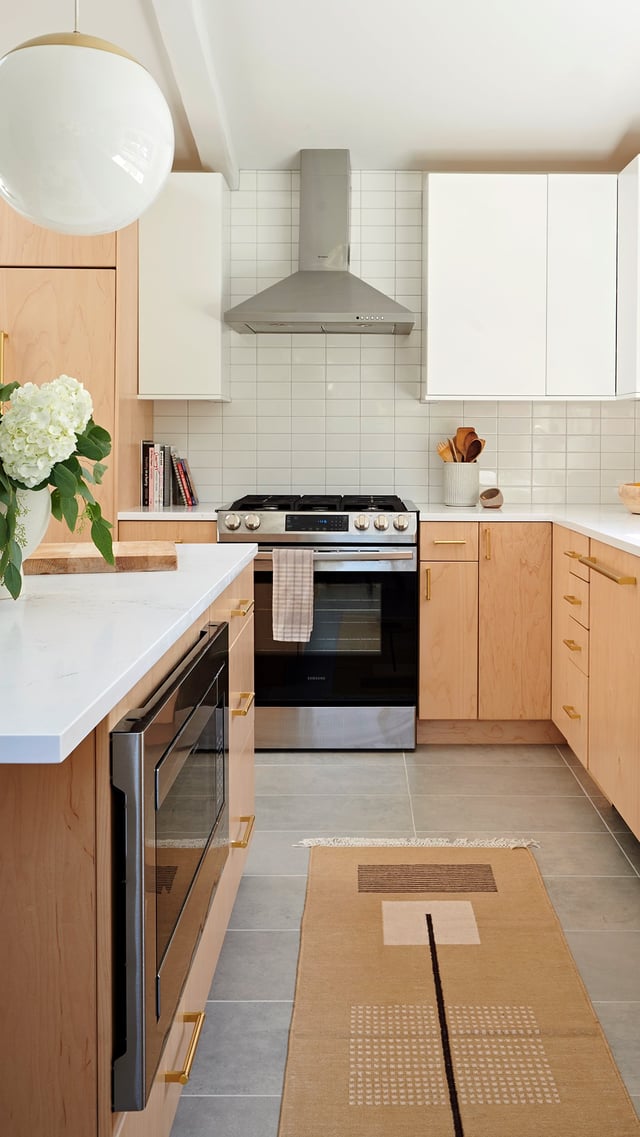
In This Article
The kitchen is aptly named the heart of the home because it’s where you cook, entertain, and gather. Can you put a price on that? It turns out the answer is yes. To determine the cost to remodel your kitchen, you need to consider many different factors. Depending on whether you’re doing a minor facelift or a total gut job, in 2025, kitchen remodeling costs can span from $10,000 for a small kitchen’s cosmetic upgrade to $75,000 for a luxe gut makeover.
Here is how we break these numbers down. Before diving into your project, you'll need to understand how these costs factor into your budget, and how prices vary by city. Read on for everything you need to know to plan the perfect kitchen remodel this year.
Turn your renovation vision into reality
Get matched with trusted contractors and start your renovation today!
Find a Contractor
How much does it cost to renovate a kitchen?
The cost to renovate a kitchen in 2025 can range widely depending on the scope of the project, the materials you choose, and where you live. On average, homeowners in the U.S. spend between $22,300 and $55,400 for a mid-range kitchen renovation. However, for high-end renovations with custom cabinets, luxury appliances, and premium countertops, the price can soar to $75,000 or more. If you're planning a smaller update, like refinishing cabinets or replacing a few appliances, you might be able to keep the project under $10,000. A good rule of thumb is to budget 5% to 15% of your home's value for a kitchen remodel, ensuring you don't overspend and still add value to your home.

"Whether you’re working with a designer on a design-build project or doing it yourself, find a contractor who can walk you through the process clearly. Make sure you handle permits, approvals, and material orders in advance so that once work begins, there’s no costly downtime."
Sorina Panfil, Art Deco Enterprises
You can save on total kitchen remodeling costs by being prepared. “Good planning is everything,” says Sorina Panfil, a Block contractor from Art Deco Enterprises. “Whether you’re working with a designer on a design-build project or doing it yourself, find a contractor who can walk you through the process clearly. Make sure you handle permits, approvals, and material orders in advance so that once work begins, there’s no costly downtime.”
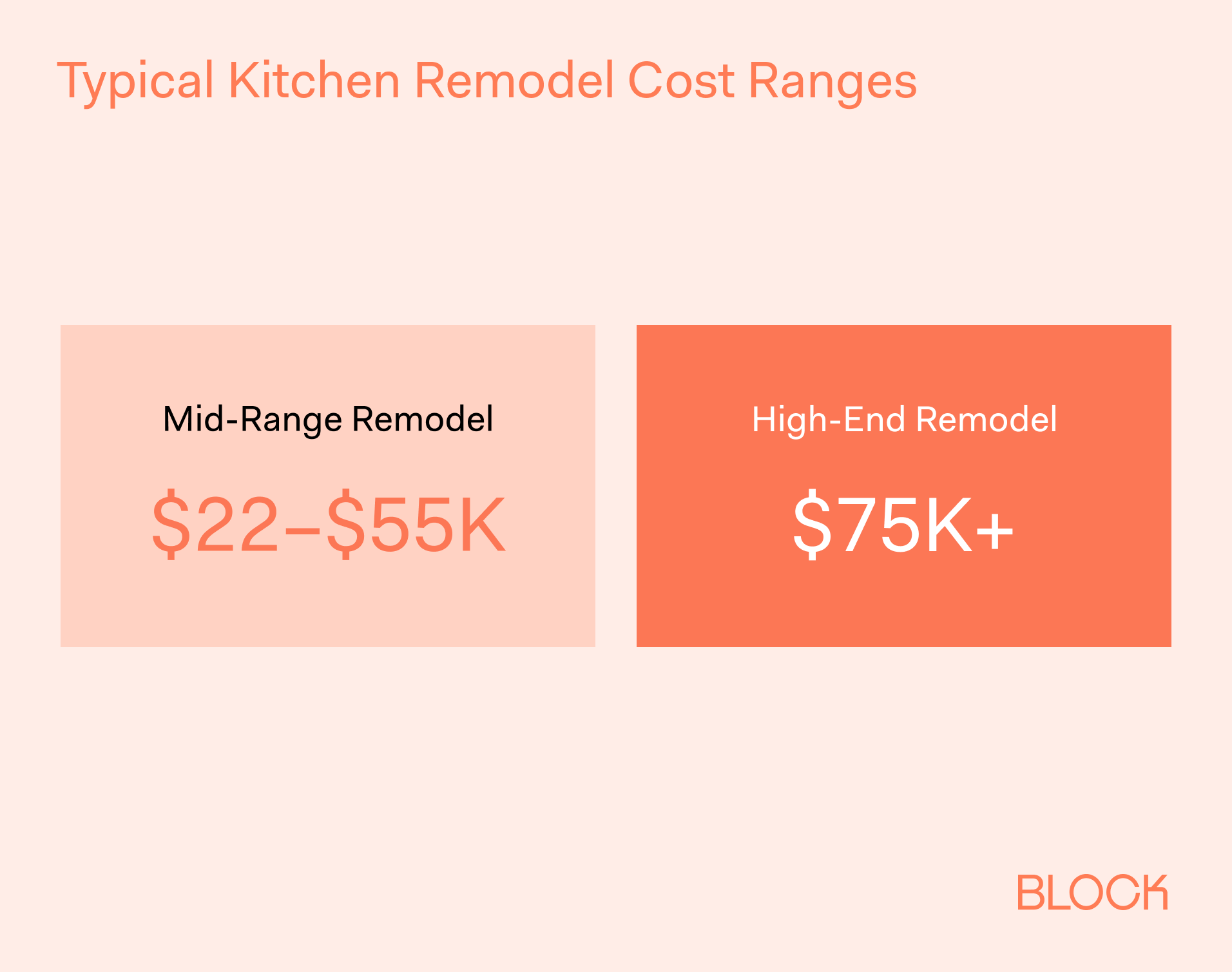
Where you live can significantly impact the cost of a kitchen remodel. In large metropolitan areas like New York City and San Francisco, prices tend to be higher due to the cost of living and demand for contractors. For example, a mid-range kitchen remodel in New York can easily exceed $50,000, while the same project might cost around $30,000 in a city like Denver.
In more affordable markets like Dallas or Atlanta, you could pay closer to $20,000 to $25,000 for a similar project. It's always a good idea to get quotes from multiple contractors in your area and compare costs to get the best deal without sacrificing quality.
Labor rates for kitchen remodeling can vary significantly based on geographic location due to factors such as the cost of living, local economic conditions, and availability of skilled labor. For instance, in major metropolitan areas where the cost of living is higher, labor rates tend to be more expensive. To give you a clearer idea of these variations, let's look at the median expenses for kitchen remodels in several key cities, including labor and materials: In San Francisco, the median cost is $40,000–$72,000, while Los Angeles sees a median expense of $24,000–$43,000. In Boston, it's $32,000–$56,000. New York City rounds out the list with a median cost of $35,000–$63,000 for kitchen remodel labor and materials. These figures highlight the importance of considering your location when budgeting for a kitchen remodel. Use Block’s Renovation Studio to generate realistic, real-time budget estimates based on your location and project scope.
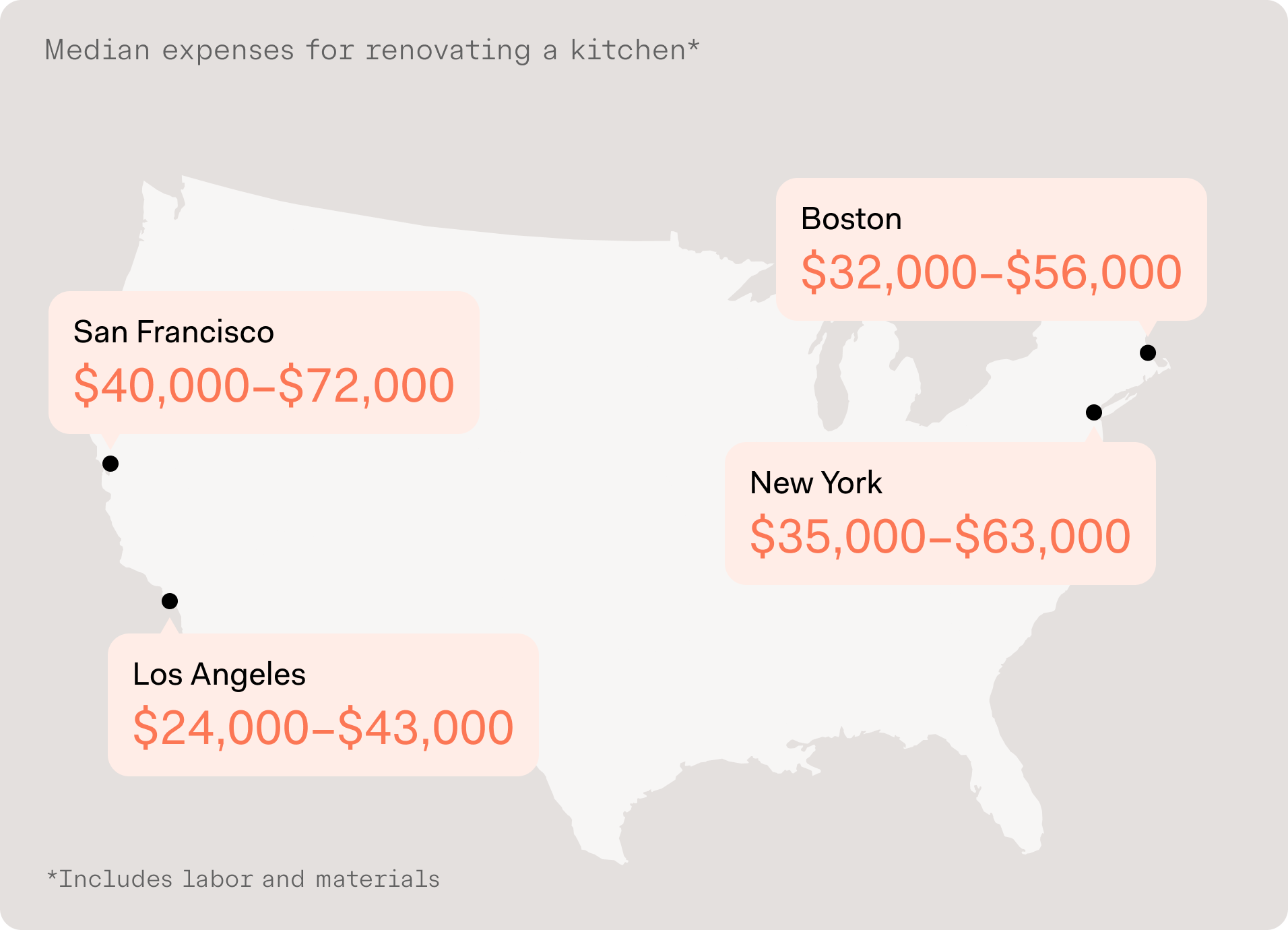
Several key factors will influence how much you spend on your kitchen renovation. First, the size of your kitchen plays a big role—larger kitchens naturally require more materials and labor. The quality of materials is another major cost driver. Custom cabinets, natural stone countertops, and high-end appliances will cost significantly more than stock options or laminate countertops.
The layout of your kitchen can also impact costs; changing the footprint, such as moving plumbing or electrical outlets, will add to your total. Finally, labor costs vary by region and the complexity of your project. Don't forget to budget for permits and unexpected expenses, which can add an extra 10% to 20% to your total cost.
Renovate with confidence every step of the way
Step 1: Personalize Your Renovation Plan
Step 2: Receive Quotes from Trusted Contractors
Step 3: Let Us Handle the Project Details

The size of your kitchen is one of the biggest factors in determining the overall cost of your renovation. Smaller kitchens generally cost less to renovate because they require fewer materials and less labor, but that doesn't always mean the project is cheap. Let's break it down:
Small kitchens (60-90 square feet)
If your kitchen falls into this category, the renovation cost will typically range from $11,000 to $20,000, depending on your chosen materials and finishes. A smaller space may require less flooring, fewer cabinets, and fewer appliances, but it also limits your design options. However, with some smart planning, you can make a small kitchen feel larger and more functional by focusing on space-saving layouts and multi-functional pieces.
Medium kitchens (90-120 square feet)
For a medium-sized kitchen, you're looking at renovation costs ranging from $17,000 to $37,000. This is where many homeowners find a sweet spot, as you have enough space to explore creative layouts and design ideas without the project becoming overwhelmingly expensive. In this range, you can often afford better materials like granite countertops or custom cabinetry, which can add value to your home.
Large kitchens (120-200 square feet)
If you have a large kitchen, the renovation costs can range from $30,000 to $75,000 or more. Bigger spaces mean more materials, appliances, and labor. Additionally, larger kitchens offer more flexibility for adding high-end features like kitchen islands, double ovens, or expansive pantry space. However, because of the size, even minor design changes or higher-end finishes can quickly add up, so keeping your budget in check and prioritizing the upgrades that matter most to you is important.
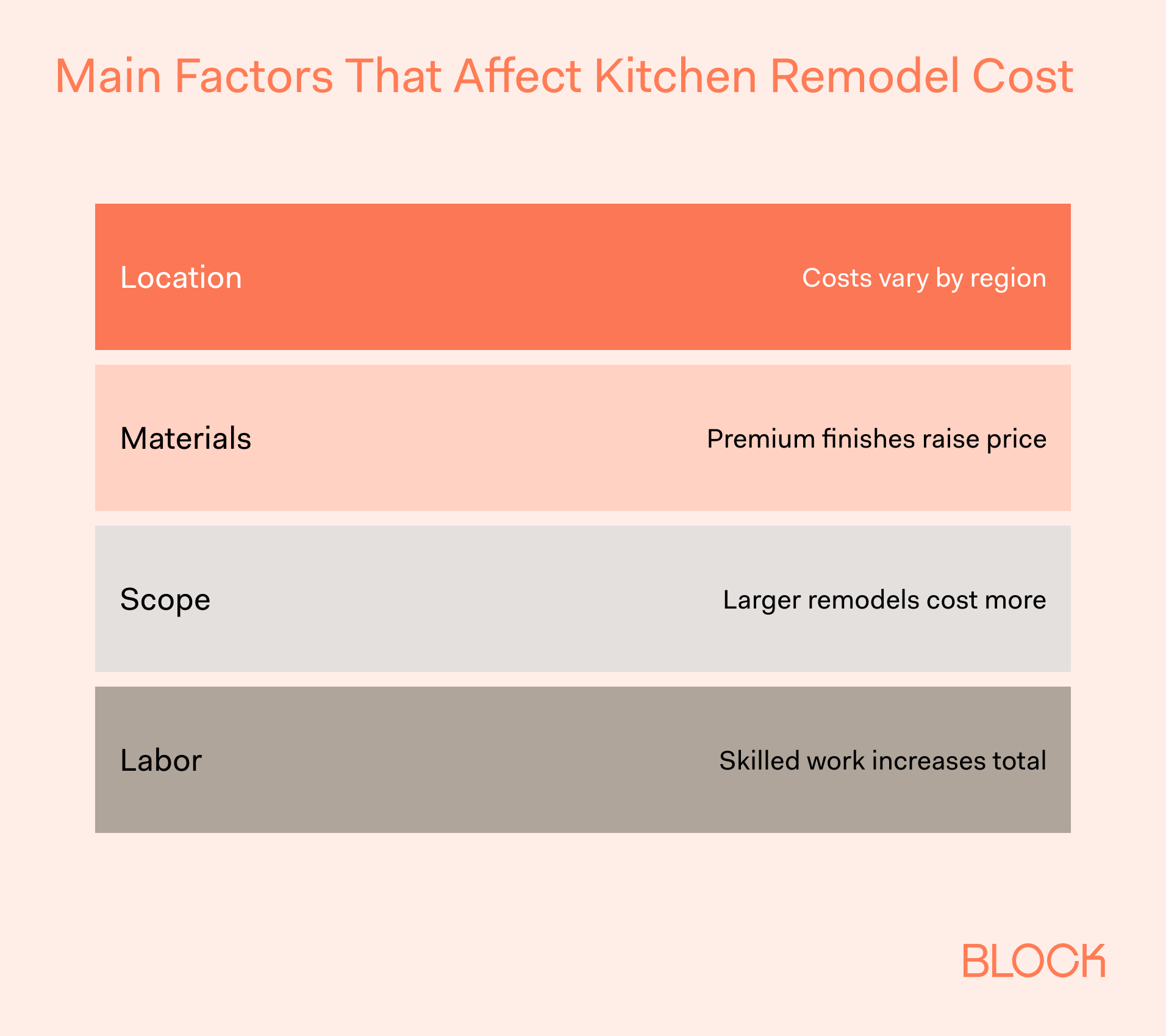
The type of finishes you choose will play a major role in the overall cost of your kitchen renovation. Similarly, stock cabinets are more affordable than custom-built ones made from high-quality wood. Even smaller details, like the hardware on your cabinets or the type of sink you select, can add up. It's important to strike a balance between your style preferences and budget. While splurging on certain materials can elevate the overall look of your kitchen, there are plenty of cost-effective options that still look great and perform well.
From countertops to flooring, the quality and type of materials you choose will have a big impact on your budget. For example, opting for laminate countertops will cost significantly less than going for marble or quartz.

Finishes can range from budget-friendly to super luxeluxury, each offering different aesthetics and durability. Here's how they break down:
For homeowners looking to keep costs down, a budget finish typically includes stock cabinets, laminate countertops, and basic appliances. Renovations with budget finishes can cost between $11,000 and $15,000, depending on the size of the kitchen.
While these finishes may not have the same visual impact or durability as higher-end options, they can still be functional and attractive if chosen thoughtfully. This is ideal for rental properties or those who want a refreshed look without breaking the bank.
Mid-grade finishes offer a step up in both style and quality, with options like semi-custom cabinets, quartz or granite countertops, and energy-efficient appliances. Renovations with mid-grade finishes generally cost between $15,000 and $40,000. This is a popular choice for homeowners who want a blend of aesthetics and practicality. You'll get more durable materials that stand up to everyday use, and your kitchen will feel more custom and modern.
A high-end finish includes premium materials like custom cabinetry, natural stone countertops, and high-performance appliances. These finishes can easily push the cost of a kitchen renovation to $40,000 or more. High-end finishes not only elevate the look of your kitchen but also increase its functionality and longevity. You're paying for craftsmanship, durability, and unique design elements that make your kitchen stand out.
At the luxury end, the sky's the limit. Custom everything—think bespoke cabinetry, imported stone countertops, and top-of-the-line appliances like a Sub-Zero fridge or Wolf range—can bring the total cost to $75,000 or more. Luxury finishes often include advanced technology, such as smart appliances and integrated lighting systems. While the price tag is steep, the end result is a kitchen that feels like a work of art, with no detail overlooked and the highest level of craftsmanship. This is ideal for homeowners who want a dream kitchen with every modern convenience.
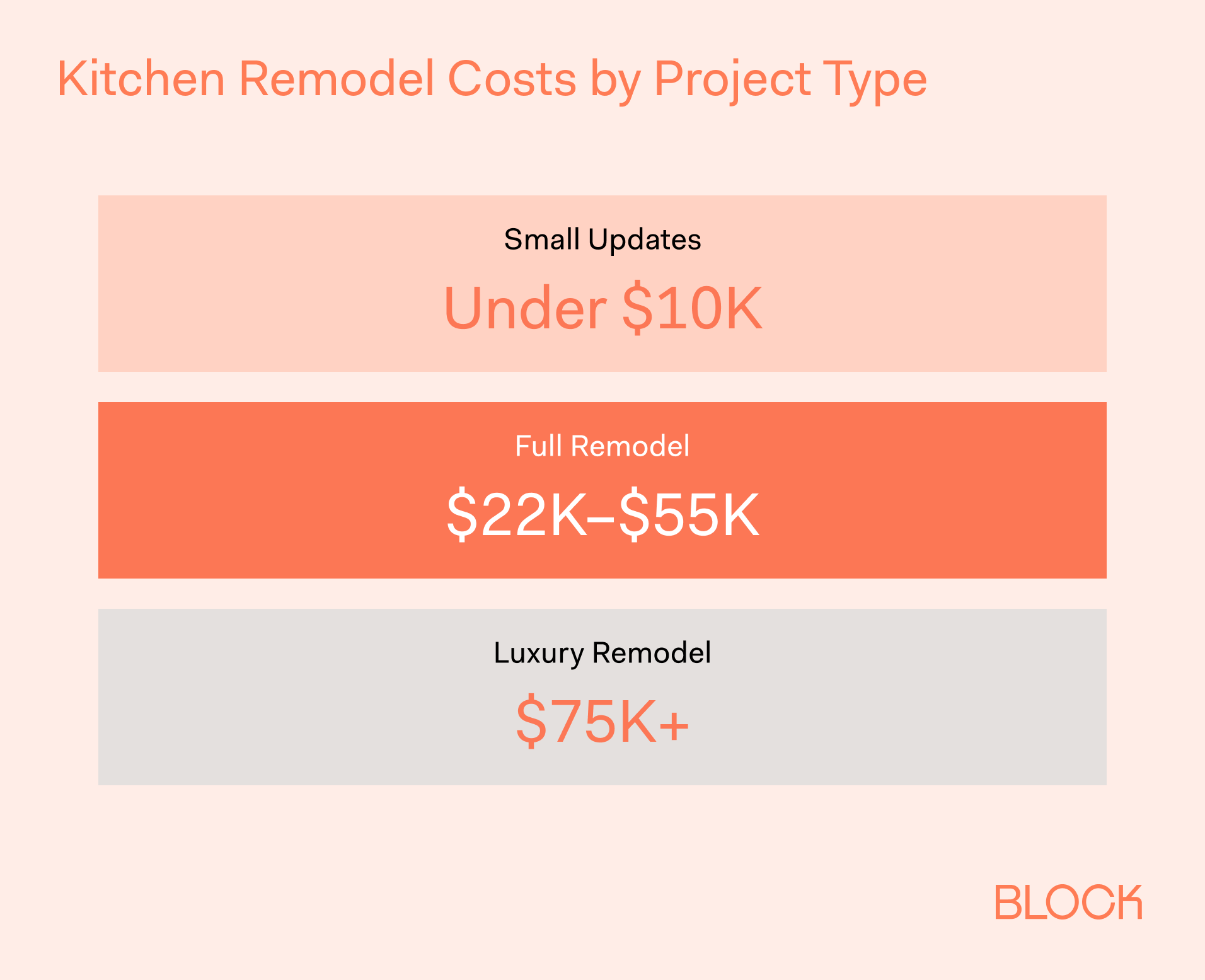
Transparent Pricing You Can Trust

Labor costs include everything from demolition and electrical work to installing cabinets and appliances. On average, labor makes up about 30-40% of the total renovation cost. For a basic kitchen remodel, you can expect to spend anywhere from $3,000 to $15,000 on labor alone, depending on the scope of the work and where you live.
In areas where contractor demand is high, like major cities, labor costs will naturally be higher. It's also worth noting that more complex jobs—such as moving plumbing or electrical systems—will require specialized labor, which adds to the cost. Always get multiple quotes from contractors to ensure you're getting a fair price.
The timeline for a kitchen remodel can vary significantly depending on the complexity of the project. On average, a full kitchen remodel can take anywhere from 6 to 12 weeks, not including the planning and design phase, which can add another few weeks to the process. Simple updates, like new countertops and appliances, may only take a few weeks.
But if you're doing a complete overhaul—especially one that involves moving walls, rerouting plumbing, or changing the layout—expect the timeline to stretch closer to three months or even longer. It's always a good idea to build in extra time for unexpected delays, such as waiting for materials to arrive or dealing with unforeseen issues like electrical upgrades or structural repairs.
Before you can start tearing out old cabinets or installing new appliances, you'll need to ensure you have the proper permits and approvals. In most cities, a kitchen renovation requires permits for electrical work, plumbing, and any structural changes. The cost of permits varies depending on where you live, but you should budget anywhere from $500 to $2,000.
Skipping this step can lead to fines and complications if you decide to sell your home later, so it's best to handle permits upfront. Additionally, working with a licensed contractor ensures that everything is up to code. Be sure to check with your local city or county government to understand the specific requirements for your area.
Remodeling your kitchen doesn't happen all at once. There are several key stages to navigate, each requiring careful planning and coordination. Breaking the process into these stages helps ensure everything runs smoothly and doesn’t end up costing you more than your budget.
The planning stage is where everything begins. This is when you establish your budget, set your goals for the renovation, and figure out what changes you want to make. During this stage, you'll likely meet with contractors, browse for materials, and start thinking about the layout. It's important to be realistic about what you can afford and how long the project will take. Proper planning will save you from costly mistakes down the road and help you prioritize the aspects of your kitchen that matter most.
Once the planning is done, the design phase kicks off. During this stage, you'll work with a designer or architect to create the look and feel of your new kitchen. This includes choosing colors, materials, fixtures, and appliances. You'll also decide on the layout and make any necessary adjustments to the original plan. It's an exciting phase because you start to see your ideas come to life on paper, but it's also important to be practical about how the design will work in your everyday life. Don't forget to factor in functionality and workflow when making your design choices.
A pre-construction phase involves securing permits, ordering materials, and finalizing contracts with your contractor before any construction begins. This phase can take a couple of weeks or longer, depending on the project's complexity and how quickly you can get everything lined up. It's important to communicate closely with your contractor during this phase to ensure all the necessary materials are ordered and delivered on time. Any delays in material shipments or permit approvals can push back the start date of your renovation, so being organized is key.
This is where the magic (and the mess) happens. The construction phase involves everything from demolition and framing to installing new cabinets, countertops, flooring, and appliances. Depending on the size of your kitchen and the extent of the renovation, construction can take anywhere from 4 to 12 weeks. During this time, your kitchen will be mostly or entirely unusable, so planning for alternative cooking arrangements is essential. While construction can be noisy and disruptive, seeing the daily progress can be incredibly rewarding as your vision takes shape. Be prepared for occasional setbacks, as unforeseen issues sometimes arise during this stage.
Once the construction work is complete, the post-construction phase still needs to be considered. This includes a final inspection to ensure everything is up to code and works properly. It's also the time for your contractor to complete any finishing touches, like paint touch-ups, installing hardware, and making sure all appliances are functioning correctly.
After the final inspection, your kitchen is ready to use. At this stage, it's important to review the work carefully and ensure everything meets your expectations. Take note of any items that need correction and create a punch list to share with your contractor before making the final payment. Once that's handled, you can finally enjoy your brand-new kitchen!
The cost of your kitchen remodel is going to be linked to the contractor who works on your remodel. Each professional will have a slightly different proposal based on their ways of working, the conditions of your project, and materials. It’s always important to get multiple contractor quotes so you can compare costs apples to apples and have total transparency into the budget.
While budget is important, you also want to ensure the contractor is qualified, experienced, and easy to work with. Taking the time to thoroughly vet potential contractors can save you from stress and unexpected costs.
Block’s platform matches you with vetted professionals who specialize in kitchen remodels, taking your specific needs into account. It streamlines the process, so you don’t have to rely solely on word-of-mouth recommendations or spend hours researching.
Regardless of how you find your contractor match, you’ll always want to consider the following key factors before making your final choice.
One of the most important things to look for in a contractor is their qualifications and experience. Make sure they are licensed and insured to work in your area, as this protects you in case something goes wrong. A contractor with several years of experience will likely be more familiar with the challenges that come with kitchen remodels, from plumbing issues to electrical work. Don't hesitate to ask how long they've been in business and if they have specific experience with projects like yours. An experienced contractor is more likely to deliver quality work on time and within budget.
Reviews and references are essential when evaluating a contractor. Look for reviews on reputable websites like Google, Yelp, or the Better Business Bureau to see what past clients have said about their work. Pay attention to any patterns in the reviews, whether positive or negative, to get a clearer picture of the contractor's strengths and weaknesses.
Additionally, ask the contractor for references and reach out to a few previous clients to hear firsthand about their experience. This will give you a more personalized insight into how the contractor handles projects and any potential issues.
A strong portfolio is another important factor to consider. Ask to see photos of the contractor's previous kitchen remodels to get an idea of their style and craftsmanship. Many contractors will have a portfolio available online or can show you examples during your initial meeting. This is also the time to ask about industry credentials or affiliations, like being a National Kitchen and Bath Association (NKBA) member. Credentials can indicate a contractor's commitment to ongoing education and adherence to industry standards. A solid portfolio and relevant credentials can give you added confidence in their abilities.
Get detailed quotes from multiple contractors so you can compare prices. Be wary of any quote that seems significantly lower than the others, as this could be a red flag for cut corners or unexpected charges later. Make sure the quote includes all aspects of the project, from materials and labor to any permits or additional fees. You want a contractor who is transparent about costs upfront and willing to work within your budget. Remember, a higher price tag often reflects better quality and service, so try to find a balance between cost and value.
Compare Proposals with Ease
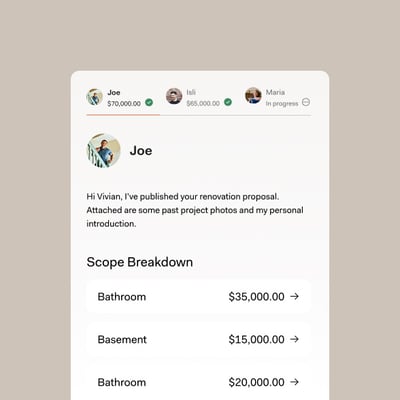
Good communication is key to a successful kitchen remodel. When meeting with potential contractors, pay attention to how they communicate. Are they easy to reach? Do they respond to your questions promptly and clearly? A contractor who is responsive and attentive during the planning phase is likely to be just as engaged throughout the remodel.
You'll be working closely with this person for weeks or even months, so having open lines of communication is crucial. Choose someone who listens to your needs, keeps you updated, and addresses concerns quickly. Good communication will make the remodeling process smoother and less stressful for everyone involved.
Hiring a contractor for a renovation project can feel like a big undertaking, especially when there are so many factors to consider: budget, experience, communication, and quality of work, just to name a few. With so many options, it's easy to get overwhelmed or, worse, end up hiring someone who isn't the right fit for your project. That's where Block comes in.
Block matches you with qualified contractors who meet your specific needs. Whether you're embarking on a kitchen remodel, bathroom renovation, or a more extensive home makeover, Block can help guide you through the process and find the perfect contractor for the job so you can hire with confidence.
In 2025, kitchen remodeling costs are part of the investment to transform your home’s style and enhance functionality, all the while potentially boosting its value. By understanding current trends, budgeting effectively, and planning your project meticulously, you can better understand what goes into creating the kitchen of your dreams. Whether you’re upgrading appliances, redesigning layouts, or incorporating eco-friendly features, a professional kitchen remodeling contractor can help bring your vision to life.
Remodel with confidence through Block

Connect to vetted local contractors
We only work with top-tier, thoroughly vetted contractors

Get expert guidance
Our project planners offer expert advice, scope review, and ongoing support as needed
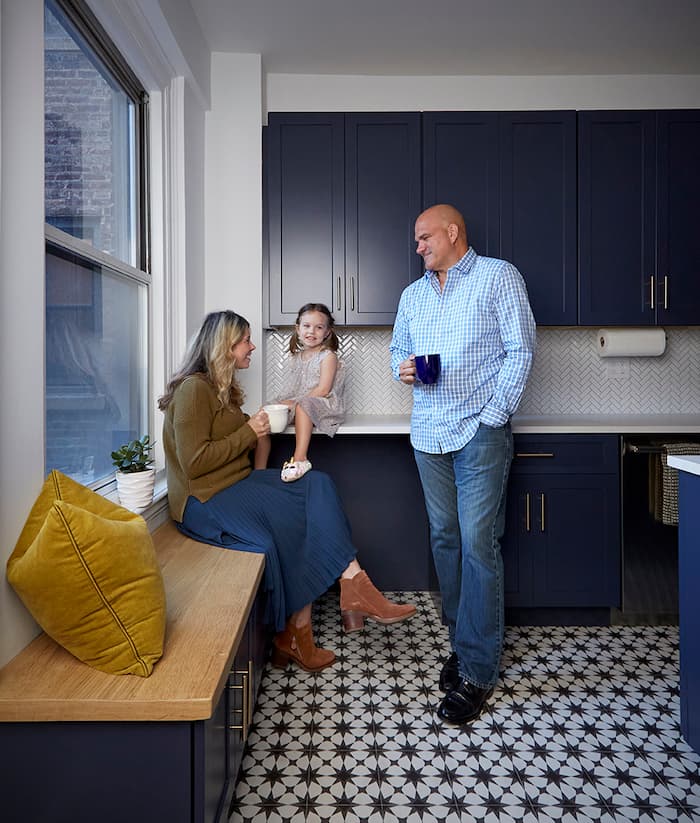
Enjoy peace of mind throughout your renovation
Secure payment system puts you in control and protects your remodel

Written by Jordi Lippe-McGraw
Jordi Lippe-McGraw
How much does a kitchen remodel increase home value?
How much does reconfiguring my kitchen layout add to the remodeling costs?
What kinds of kitchen remodeling projects usually have lower price tags?
If your goal is a fresh look without a full overhaul, focus on upgrades that don’t disturb plumbing, gas, or electrical locations. These projects stretch your budget because more of your spend goes to visible finishes instead of behind-the-wall work. They also move faster and often require fewer permits, which reduces soft costs and schedule risk. More affordable projects to consider:
What is a realistic budget for a kitchen remodel?
In what order should you remodel a kitchen?
What is the most expensive part of a kitchen remodel?
How do you negotiate a kitchen remodel?
What are kitchen remodeling projects and material choices that have the greatest ROI when it comes time to sell?
Resale value tends to favor clean design, reliable functionality, and broadly appealing finishes. Most buyers look for bright spaces, durable materials, and practical storage. Aim for a cohesive, neutral palette that photographs well, pair it with mid-range fixtures from reputable brands, and invest in lighting and organization that make the kitchen feel bigger and easier to use every day.
Add the below features to improve resale value:
I’m building an ADU—how much does constructing a new kitchen typically cost?
For a compact ADU kitchen (one-wall or galley, stock/semi-custom cabinets, standard appliances), plan roughly:
What drives the price range:

Renovate confidently with Block
Easily compare quotes from top quality contractors, and get peace of mind with warranty & price protections.
Thousands of homeowners have renovated with Block

4.5 Stars (100+)

4.7 Stars (100+)

4.5 Stars (75+)

Cost
How Much Does a Bathroom Addition Cost?
09.26.2025
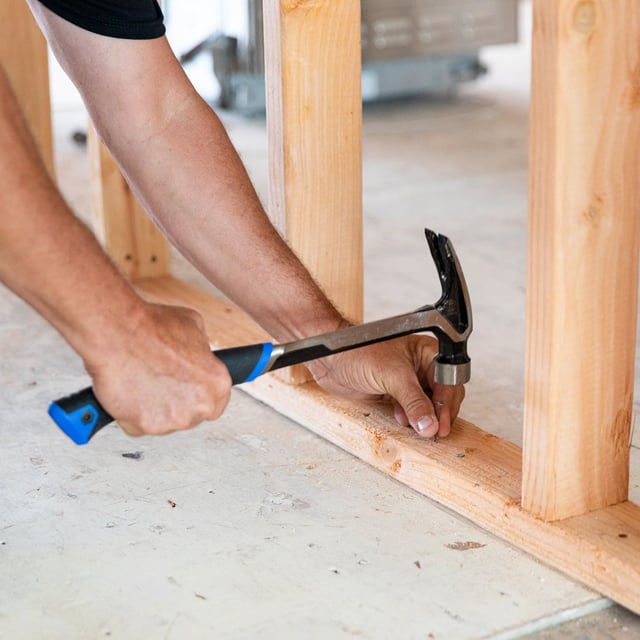
Cost
Calculating the Cost of Your 12x24 Addition
09.18.2025
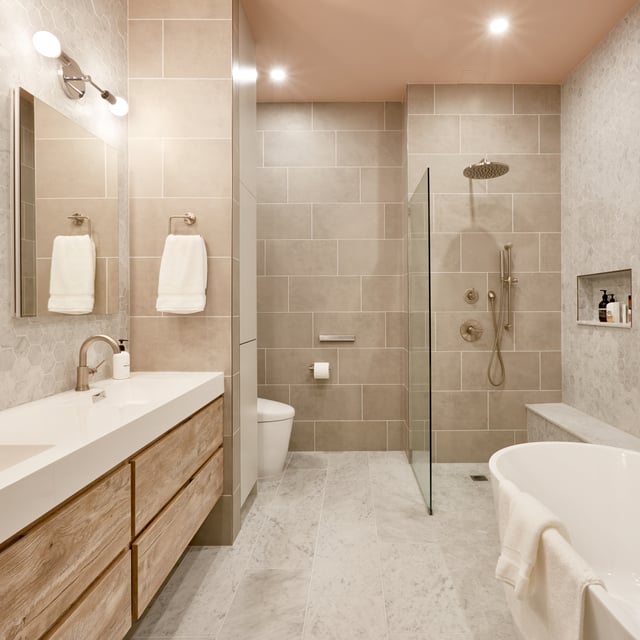
Cost
10x10 Bathroom Remodeling Costs
09.18.2025

Cost
The Average Cost of a Jacuzzi Bath Remodel—and How to Save
09.18.2025

Cost
Ceiling Installation Costs: Repairs & Replacement Pricing
09.05.2025
Renovate confidently